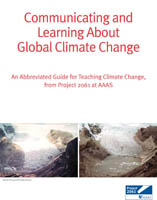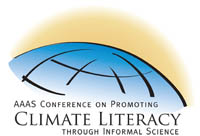Project 2061 Promotes Climate Literacy
A science literate person needs to understand the nature of science and scientific evidence in order to make meaningful decisions. But studies have shown that most Americans cannot provide correct answers to questions about the design of science experiments or about the nature of scientific inquiry (National Science Board, 2008).
In the area of climate change specifically, many U.S. adults lack the basic information needed to understand the scientific evidence. A recent survey by Public Agenda (2009), for example, finds that nearly 40% of Americans cannot name a fossil fuel, and 51% cannot name a renewable energy source. What is more, 56% and 32% believe that nuclear and solar power respectively contribute to global warming.
Such misconceptions can undermine even the most well-intentioned efforts to educate and engage the public. To help address these misconceptions and to help students’ develop a solid understanding of global climate change, Project 2061 has been increasing its efforts to provide resources for the teaching and learning of climate science.
In 2007, Project 2061 produced a widely distributed booklet on Communicating and Learning About Global Climate Change for a town hall meeting on the topic at the AAAS annual meeting. This past February, Project 2061 staff led a session on weather and climate learning goals for a teacher institute on climate change at the American Museum of Natural History in New York City. Staff later returned to the museum to present a “Using Atlas of Science Literacy” workshop for museum staff and local teachers.
Project 2061 has also collaborated with the National Oceanic and Atmospheric Administration (NOAA) to define and promote climate literacy. With NOAA funding in 2007, Project 2061 provided a workshop that began the process of defining climate literacy. Project 2061 later worked with NOAA on the development of the guide Climate Literacy: The Essential Principles of Climate Science. (See related interview in this issue with Frank Niepold of NOAA.)
Building on these efforts, Project 2061 is excited to announce its newest ventures in the area of climate science literacy. Through standards-based teaching resources and a major conference for informal science educators, Project 2061 is supporting climate literacy both in and out of the classroom.
Resources for Teaching Weather and Climate
Thanks to two new grants from NOAA and NASA, Project 2061 will provide science educators with free, online access to high-quality resources designed to increase middle school students’ weather and climate literacy. The teaching resources, including classroom activities and assessment tools, will cover a variety of earth, ocean, and atmospheric phenomena.
With a three-year $750,000 grant from NOAA, Project 2061 will develop an online collection of resources for climate literacy based on data from NOAA’s global observations of oceans, atmosphere, land surface, and the biosphere. The resources will be carefully aligned to the learning goals in the guide Climate Literacy: The Essential Principles of Climate Science and in national and state science content standards. The resources will include a range of real-world phenomena (e.g., objects, systems, events) and representations (e.g., models, diagrams, simulations) designed to illustrate key climate concepts. The resources will also take into account students’ common misconceptions related to climate and climate change.
The two-year $150,000 NASA project will similarly develop phenomena and representations based on NASA’s Earth observation data and its Earth system models. Project 2061 will develop an online and searchable collection of interrelated instructional resources for teaching concepts that are central to understanding weather and climate. The collection will be carefully coordinated with NASA’s strategic education framework and aligned with the relevant learning goals in national and state science content standards.
For more on the new grants, read the AAAS news story.
View two examples of phenomena that can be used to help middle school students understand the idea of a Spherical Earth:
Photographs of Earth in Space provides several photographs that, taken together, provide evidence for the idea that the Earth is spherical.
Zoom Out from a Place on the Earth targets the student misconception that there are two Earths, a spherical one in space and a flat one that we stand on.
AAAS Conference on Promoting Climate Literacy through Informal Science
With funding from the National Science Foundation, AAAS Project 2061 and the Education and Human Resources Directorate are organizing a climate literacy professional development conference especially for educators in informal science institutions and projects—including science centers, museums, zoos, and aquariums; media projects; and community programs. The conference will take place in San Diego on February 17-18, 2010, and will lead directly into the 2010 AAAS Annual Meeting on February 18-22, also in San Diego.
AAAS is organizing the invitational conference in partnership with the Birch Aquarium, the public exploration center for the Scripps Institution of Oceanography. In addition to expert presentations on all aspects of climate literacy and what it entails for educators and for the public, the conference will also provide a variety of hands-on opportunities for participants to apply their new knowledge and skills to their own programs and projects.
“The conference will bring together a wide range of informal science educators to focus on climate literacy,” said Jo Ellen Roseman, director of AAAS Project 2061, who will serve as principal investigator and will organize the conference with Shirley Malcom, head of AAAS’s Education and Human Resources Directorate.
“It will be a superb opportunity for those working in informal science settings to expand their understanding of climate change science and consider contributions they can make in helping the public understand causes and implications of climate change,” Roseman added.
To expand the reach of the Climate Literacy conference, AAAS will develop Web content and a print publication designed to make the professional development resources generated by the conference available to a wider audience of informal science education practitioners.
Learn more about the AAAS Conference on Promoting Climate Literacy through Informal Science.
References
Bittle, S., Rochkind, J., & Ott, A. (2009). The energy learning curve. New York: Public Agenda.
National Science Board. (2008). Science and engineering indicators 2008. Arlington, VA: Author.
# # #
For more information about Project 2061’s climate literacy resources and the AAAS Climate Literacy Conference, please contact:
Director: Dr. Jo Ellen Roseman, (202) 326-6752
Communications Director: Mary Koppal, (202) 326-6643
Also in the September/October 2009 issue:






